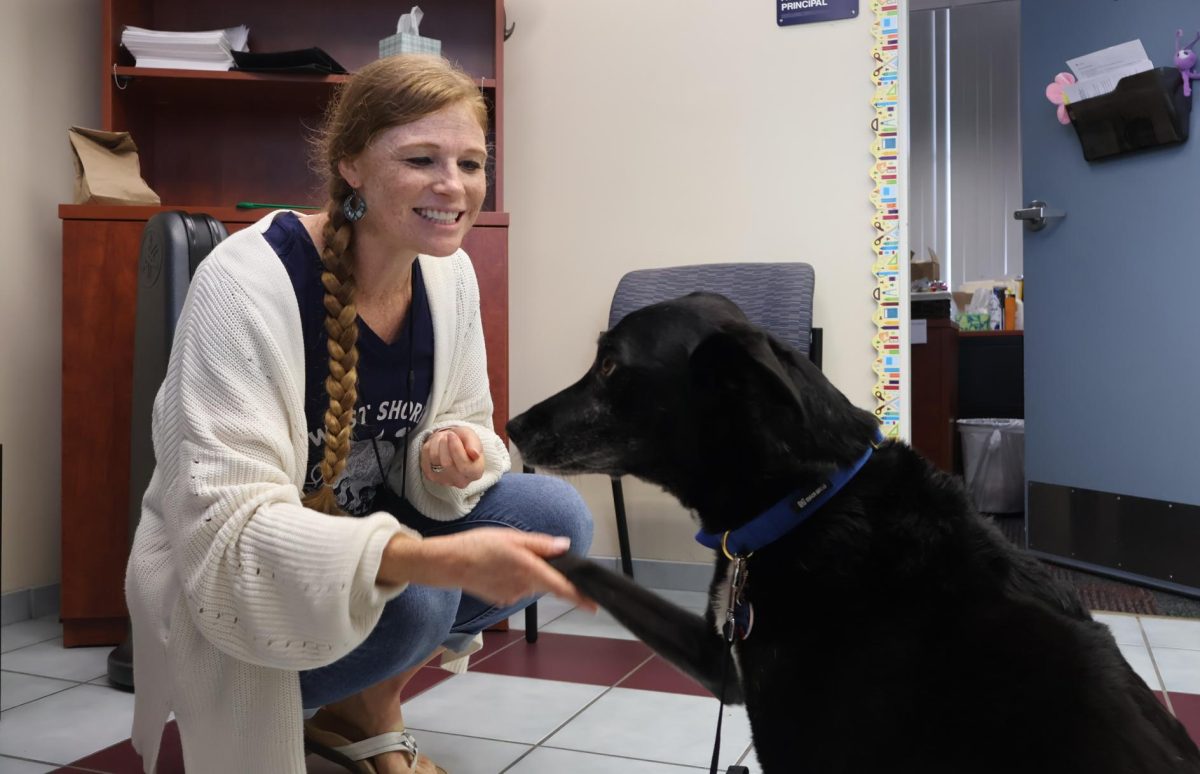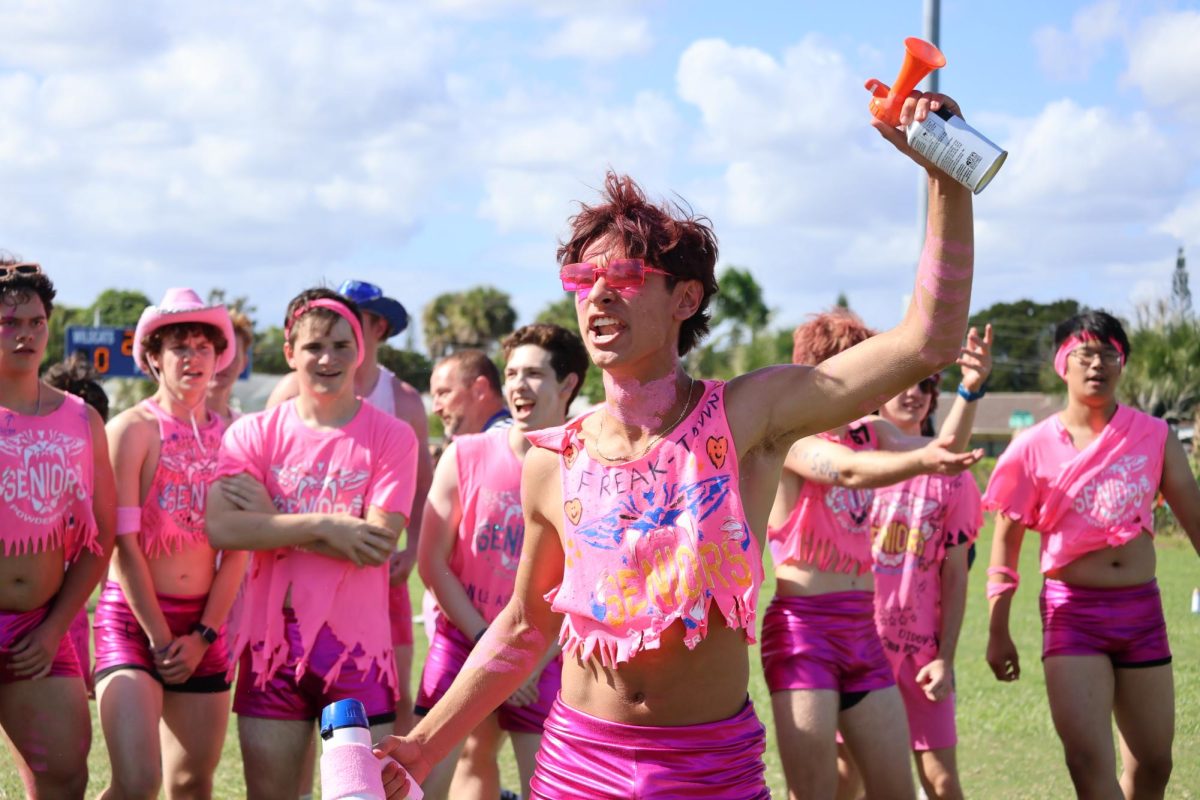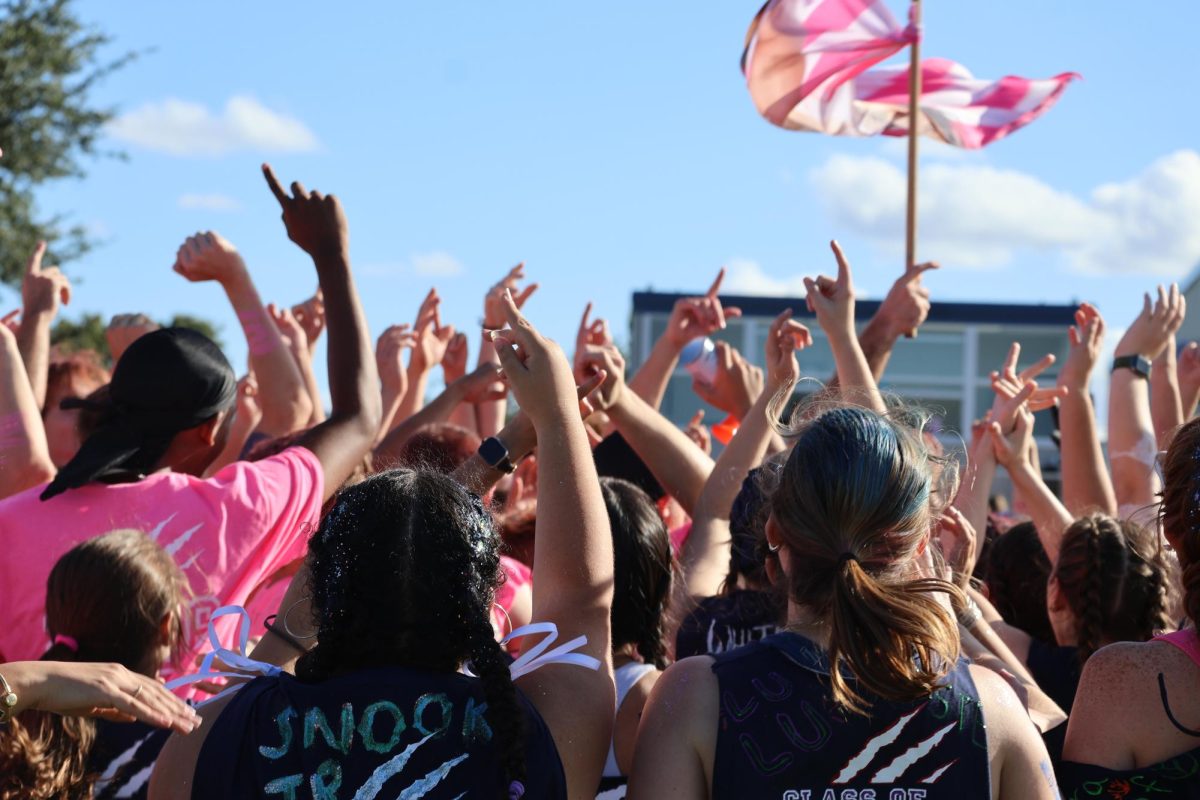Lines of scrimmage
Powerpuff poses dilemma for transgender junior
Rose Rodriguez shows off her shirt for Powderpuff.
November 2, 2022
Junior Class President Rose Rodriguez heard classroom debate over if she should participate in the Powderpuff flag football game and brushed it off. Despite not planning on participating, being publicly transgender while her peers were preparing for the game on Sept. 22 was controversial.
Powerpuff is an annual activity where junior and senior girls compete in flag football while boys perform a dance routine.
“Most people haven’t talked directly to me, but there’s been a few people that would share their opinion with me that I shouldn’t do it,” Rodriguez said.
Rodriguez said she avoided the game because she didn’t want to upset anyone by participating on either side.
“I don’t want ‘local [trans-person] destroys our game in Powderpuff,’” Rodriguez said. “It kind of sucks because I’m sacrificing an experience I could have. I don’t want to give into what people are telling me to do because I was born a man.”
Even so, Rodriguez welcomes differing opinions.
“I wish there was just one answer for it,” Rodriguez said. “I don’t want to be a professional athlete anyways, so the topic matters a lot less to me in that sense. Maybe there are cases where competing would be acceptable and where it would not be acceptable.”
Junior Sofia Palermo, a friend of Rodriguez, said she does not think gender is an important factor in Powderpuff compared to athletic ability.
“Many girls on both sides may be inexperienced with [flag football] itself, and some may already be very good at it,” Palermo said. “Both sides have advantages and disadvantages. I know it’s a sensitive topic, but at some point, it’s going to have to be faced in society.”
Joseph Estevez, physics teacher and junior Powderpuff coach of four years, said competitive balance is more important than gender in the event.
“Regardless of the situation, if someone is really skilled at something and they are competing against people that are not skilled, it is not fun,” Estevez said. “Most of the girls have never played flag football before. As far as sports and genders, I don’t think it should make a difference.”
Rodriguez said the timing of transitioning with hormones matters significantly when it comes to transgender athletes.
“If I’m 18 and have not gotten hormones, then I’m going to be physically stronger than a biological woman,” Rodriguez said. “If I started on puberty blockers when I was really young, I feel like then it should be OK. It’s almost unfair to those that are already to a certain age where it’s too late. For me, it would be too late to pursue a career in women’s sports.”
Rodriguez’s brother Xavier, a freshman at Eau Gallie High School, said he can see both perspectives.
“Although I think that as a whole it’s unfair for these transgender athletes to not compete as or with the gender they identify as, I think a possible solution could be a co-ed sports program that accepts these athletes to play with or against whomever they please,” Xavier said.
Xavier said he thinks people have exaggerated the Powderpuff situation.
“The fact that people are even arguing about Rose’s participation in Powderpuff is pointless considering she won’t be participating,” Xavier said.
Estevez said transgender students do not have any influence on school spirit, the fun, the safety or the rules of Powderpuff. He said he doesn’t think schools should be allowed to make their own rules over which genders are allowed to participate in sports or activities.
“If we’re not doing those things, then we shouldn’t be doing Powderpuff,” Estevez said. “If you ask me, then transgender people have nothing to do with those things. It should make absolutely no difference.”
The debate about Rodriguez’s participation in Powderpuff is just one part of her transition. She avoids going to the bathroom most of the time at school.
“It’s really weird, especially if I walk into the boys’ bathroom and there are other guys in there [looking at me],” Rodriguez said. “I’ll go with whatever is closer, but if the administration is watching-they’ve never given me a clear yes or no-then I just go to the boys’ one.”
Estevez said he thinks bathrooms should be gender-neutral to reduce the problem of transgender people choosing the bathroom they want.
“There should be nothing but stalls,” Estevez said. “Bathrooms should be safe places for everyone.”
Rodriguez said identifying as a female at 6-foot-3 adds another layer to the judgment she encounters in and out of restrooms.
“I had already faced prejudice, and I still do for just having darker-colored skin,” Rodriguez said. “Growing up [in Wisconsin,] I faced a lot of prejudice in the fifth and sixth grade being the only Hispanic kid.”
Despite having a negative experience with administrators in her past, Rodriguez has found her teachers at West Shore to be accepting.
“Almost all the teachers think [it’s] really awesome,” Rodriguez said. “Especially when they ask your name and stuff like that. I really appreciate it.”
Rodriguez said she always knew she was transgender but figured out how to communicate it when she was 10 years old while watching “RuPaul’s Drag Race” on television. She started coming out to her friends in sixth grade, and a year ago she came out publicly.
“I sort of figured out what a trans person was, [and] I was like ‘That sounds like me,’” Rodriguez said. “At that point, I started researching with my little tablet, and I finally found an answer.”
Rodriguez first came out to Xavier during the 2021 school year.
“I was really surprised at first because I always saw her as the stronger older brother,” Xavier said. “Then suddenly she was my stronger older sister, and that made it kind of difficult to acclimate initially.”
Rodriguez said since making the transition, she feels a lot more confident and natural, although it has come with problems in dating and friendships.
“I’ll have friends from before I transitioned and after — then the parents look at me one time — and say ‘You can’t hang out with [her],’” Rodriguez said. “I’ll ask the person out on a date, but then their parents are like ‘No, you’re not going to date a trans-person.’”
Palermo dated Rodriguez when they were in eighth grade. They found ways to help each other and understand their gender identities.
“I remember I was also having a question of identity at the time, and I began talking with [Rose] about it,” Palermo said. “Soon after, she asked me if we could experiment with some things such as makeup and clothing, and I completely supported her.”
Rodriguez said her expectations of being transgender were inaccurate.
“I thought I’d be able to do things like hormone replacement therapy right away,” she said. “[Or I’d be] really prepared to leave my family. Both never actually happened.”
Rodriguez said without good friends she “probably wouldn’t be here.”
“Realistically speaking, it’s been extremely difficult,” Rodriguez said. “I hope, whatever position somebody else is in, that it’s not as bad as mine. If you surround yourself with good people, know that it gets better.”
Palermo said she admires Rodriguez.
“I think it’s been a difficult but magnificent journey,” Palermo said. “I hope she continues to grow and express herself freely.”
Rodriguez said she does not want anyone to treat her differently.
“I wouldn’t say I’m an extreme of any sort,” Rodriguez said. “I am just another person.”


![Sophomore Isabelle Gaudry walks through the metal detector, monitored by School Resource Officer Valerie Butler, on Aug. 13. “I think [the students have] been adjusting really well," Butler said. "We've had no issues, no snafus. Everything's been running smoothly, and we've been getting kids to class on time.”](https://westshoreroar.com/wp-content/uploads/2025/08/IMG_9979-1200x800.jpg)














































